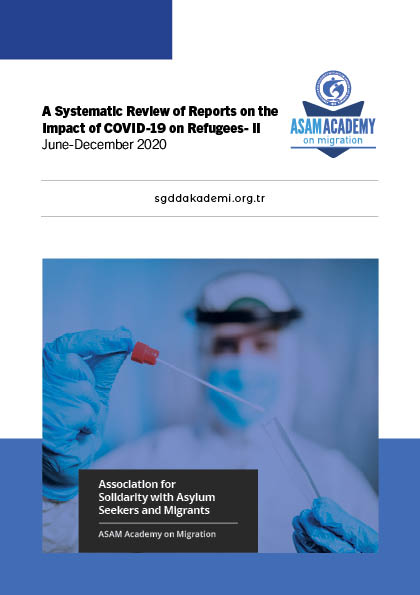
A Systematic Review of Reports on the Impact of COVID-19 on Refugees- II
Dili: İngilizce
Yayınlanma Tarihi: September 2021
Güncellenme Tarihi: -
Hakkında
COVID-19 pandemic continues to affect millions of lives across the world. Its major effects not only create serious healthcare concerns but also bring inexorable consequences in many aspects of life. Even though successful vaccines with promising results have been developed, distribution and administration processes of vaccines seem to have brought different questions as to the future of the pandemic. Moreover, while UNCHR underlines the importance of the “inclusion of refugees in vaccination plans” (Sköld, 2021)1, existing practices around the world do not seem to be prevalent yet. This, in turn, reminds us that refugees still constitute one of the most disadvantageous groups during the pandemic.
In Turkey, as of June 2021, there are more than 5 million ‘confirmed cases of COVID-19’ (WHO, 2021)2. While the vaccination program has effectively been launched, it is still not certain whether refugees in Turkey will be able to become part of the program in the near future. Therefore, regular assessment of refugees’ situations during the pandemic still plays an essential role so as to provide necessary services and assistance for them. In this respect, SGDD-ASAM, international organizations, civil society associations and other stakeholders in the field have been releasing important reports, analyses and policy briefs in the light of fieldwork conducted with refugees in Turkey to assess the impact of the COVID-19 pandemic on refugees. Part of this concern, in October 2020, ASAM Academy on Migration published its first issue of Systematic Review in which various reports that analyzed the impact of the pandemic on refugees published between April-June 2020 were comparatively analyzed to map out the general situation in the field (see ASAM Academy on Migration, 2020). This report analyzing the studies published by different organizations between June-December 2020 represents the continuation of our first report. We think that this selection of reports based on the fieldwork is adequate to provide a general image of the refugees’ situation in Turkey during the pandemic.
In this systematic review, we analyze seven studies assessing the impact of the COVID-19 pandemic on refugees conducted by different organizations. These organizations are World Food Programme (WFP), Association of Leather Textile and Shoe Workers, Mixed Migration Center (MMC), Turkish Red Crescent Society (TRSC), Inter-Agency Coordination in Turkey- UNHCR, Association for Solidarity with Syrian Refugees in İzmir and Dünya Doktorları Derneği (DDD). Having provided a brief overview of methodological features of the studies, the main findings of the reports are investigated under the titles of Access to Information about COVID-19, Access to Healthcare Services, Access to Online Education, Sources of Income (Livelihoods), Access to Basic Needs, and Protection. The main objective of this study is to provide a systematic and comparative review of conducted studies in the field so as to understand the general situation of refugees during the pandemic and identify important issues which need to be taken into account in terms of both meeting essential needs of refugees and designing further studies.